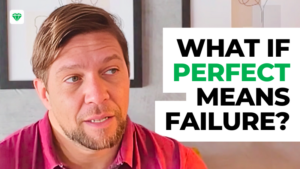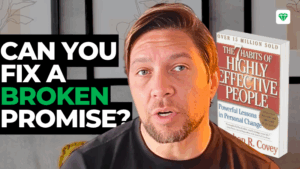
.
✅ EVO MENTORING PROGRAM: Evolve 3 Years in 3 Months. Get a Free Discovery Call.
In the book Own Your Past, Change Your Future, Dr. John Delony exposes the heart of emotional scars by saying this:
“Abuse turns relationships into poison. It’s like being lost at sea and dying of thirst, but surrounded by the wrong kind of water.”
The question is: how do we know we’re surrounded by the wrong kind of water?
More importantly, how do we recognize the toxic people who turn relationships into poison?
Toxic people can be hard to spot. At first, they may seem just like anyone else, but over time, their true colors show.
The challenge is recognizing them before they wreak havoc on your life.
Let’s break down seven types of toxic people to avoid—and learn how to deal with each one of them.
The Immature
The first type of toxic people to avoid is the immature
They inflate bad situations, turning simple setbacks into a horror show.
Every problem they see is multiplied 10 times fold.
They are experts in explaining problems with the most gruesome details, but they are incapable of proposing solutions.
The most effective way to deal with the immature is to avoid offering solutions they didn’t ask for.
When you try to fix things, you unintentionally fuel their need for attention rather than resolution.
Instead, acknowledge the situation, then step back and let them handle it.
This keeps their overreactions from becoming your problem while allowing them to manage their own issues.
By not stepping into the role of problem-solver, you prevent their chaos from dragging you down.
The Negative
The second type of toxic people to avoid is the negative.
They only see the bad side of good things. They can drain positivity from any environment.
For them, even the most enjoyable moments have a black spot. Their favorite line is, I told you. Or even worse, I knew it.
The key to handling this type of toxic person is to cut off their negativity by not responding to it.
Instead of trying to change their perspective or fix their complaints, simply let their comments fall flat.
Without the feedback they’re seeking, their negativity has nowhere to go.
By disengaging from their complaints, you stop the cycle and protect your own energy.
The Cynic
The third type of toxic people to avoid is the cynic.
They pretend to care, but they have no capacity to show any affection.
They are quick to dismiss everything with their skepticism and regardless of their best promises, they will never be there when you need them.
The most effective way to handle the cynic is to stop seeking validation or support from them.
They’re not going to provide meaningful encouragement or be there when you need them, so don’t waste your energy expecting it.
By keeping your expectations low and your interactions practical and surface-level, you prevent their skepticism from undermining your confidence or emotional well-being.
The Gossiper
The fourth type of toxic people to avoid is the gossiper
They feed on reputation destruction and are always eager to spread rumors.
They won’t keep any secrets and everything they hear can and will be weaponized.
The best way to handle the gossiper is to give them nothing to work with.
Don’t share personal information or participate in their gossip.
The less you engage with them, the less they can use against you or anyone else.
By keeping conversations neutral and steering clear of sensitive topics, you avoid becoming part of their rumor mill.
The Hypocrite
The fifth type of toxic people to avoid is the hypocrite.
The keyword for this type of toxic person is double standards.
They judge other people by the very flaws they possess. Failing to practice what they preach, they create an environment of dishonesty.
The most effective way to handle the hypocrite is to call out their double standards in a calm and factual manner.
You don’t need to argue or get defensive—just make it clear that you see the inconsistency in their actions.
This shifts the focus back onto them and exposes their behavior without creating unnecessary conflict.
By holding them accountable, you take away their power to manipulate through hypocrisy.
The Envious
The sixth type of toxic people to avoid is the envious.
Envy is the combination of ambition and laziness. They want what you have but they don’t want to work hard to get it.
So, instead of working hard to win, they work hard for you to lose.
The most effective way to handle the envious is to cut off their access to your achievements.
Stop feeding their jealousy by keeping your successes private and focusing conversations on neutral ground.
By removing the opportunity for comparison, you take away their power to sabotage or resent you.
Protect your energy and your progress by keeping your wins out of their reach.
The Tyrant
The seventh and last type of toxic people to avoid is the tyrant.
In any relationship, this type of toxic person only seeks control and domination, not connection.
They are known for climbing the ladder of life using other people’s corpses as rungs.
The most effective way to handle the tyrant is to establish clear, non-negotiable boundaries and communicate them directly.
Make sure they understand what’s off-limits and what the consequences will be if those boundaries are crossed.
Tyrants often rely on fear to maintain control, but when you set these boundaries, you shift the power dynamic.
If they cross the line, the consequence is no surprise—it’s what was clarified from the beginning.
By holding firm and following through, you signal that their attempts at control are futile.
And here’s the key: tyrants only push until they hit a wall. When they realize that pushing you doesn’t get results, they will move on to easier targets.
The strength of your boundaries protects you from retaliation because it’s clear their behavior won’t be tolerated.
It’s not about confrontation—it’s about standing strong in what you’ve already communicated.
Conclusion
So, these are the seven types of toxic people to avoid. Chances are, you’ve encountered at least one—if not all—of them at some point.
Keep in mind that the goal here is not to start a witch hunt.
But be more mindful about the types of energies we allow into our lives.
Start by seeking signs of toxicity in you and commit yourself to finding the light in others.
Healthy relationships require resilience and the ability to rise above toxic encounters, allowing us to grow stronger in the process.



